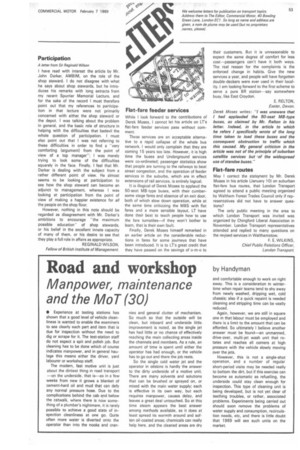Participation
Page 55

If you've noticed an error in this article please click here to report it so we can fix it.
A letter from Sir Reginald Wilson
I have read with interest the article by Mr. John Darker, AMBIM, on the role of the shop steward. I do not disagree with what he says about shop stewards, but he introduces his remarks with long extracts from my recent Spurner Memorial Lecture, and for the sake of the record I must therefore point out that my references to participation in that lecture were not primarily concerned with either, the shop steward or the depot. I was talking about the problem in general, and the basic role of structure in helping with the difficulties that bedevil the whole question of participation. I must also point out that I was not referring to these difficulties in order to find a "very comforting (argument) from the point of view of a top manager"; I was merely trying to look some of the difficulties squarely in the face. Finally, I feel that Mr. Darker is dealing with the subject from a rather different point of view. He almost seems to be looking at participation to see how the shop steward can become an adjunct to management, whereas I was looking at participation from the point of view of making a happier existence for all the people on the shop floor.
However, nothing in this note should be regarded as disagreement with Mr. Darker's ambitions to encourage "the maximum possible education" of shop stewards, or his belief in the excellent innate capacity of many of them, or his desire to see that they play a full role in affairs as appropriate. REGINALD WILSON, Fellow of British Institute of Management. While I look forward to the contributions of Derek Moses, I cannot let his article on LT's flat-fare feeder services pass without comment.
These services are an acceptable alternative to a rapid collapse of the whole bus network. I would only complain that they are coming 15 years too late. However, it is high time the buses and Underground services were co-ordinated; passenger statistics show that people are turning to the railways to beat street congestion, and the operation of feeder services in the suburbs, which are in effect extensions of rail services, is entirely logical.
It is illogical of Derek Moses to applaud the 50-seat MB-type buses, with their cumbersome stage fares and absence of an exit door, both of which slow down operation, while at the same time criticizing the MBS with flat fares and a more sensible layout. LT have done their best to teach people how to use the fare turnstiles—if they won't bother to learn, that is their own fault.
Finally, Derek Moses himself remarked in an earlier article on the considerable reductions in fares for some journeys that have been introduced. It is to LT's great credit that they have passed on the savings of o-m-o to their customers. But it is unreasonable to expect the same degree of comfort for less cost—passengers can't have it both ways. The real reason for the complaints is the enforced change in habits. Give the new services a year, and people will have forgotten double-deckers were ever used in their locality, I am looking forward to the first scheme to serve a pure BR station—say somewhere busy, like East Croydon.
E. BELTON, Exeter, Devon. Derek Moses writes: "I was unaware that I had applauded the 50-seat MB-type buses, as claimed by Mr. Re/ton in his letter. Indeed, in the article to which he refers I specifically wrote of the long time taken to load these buses and the consequent obstruction to traffic which this caused. My general criticism in the article was not of the principle of suburban satellite services but of the widespread use of standee buses."
Flat-fare routes
May I correct the statement by Mr. Derek Moses in his article (January 10) on suburban flat-fare bus routes, that London Transport agreed to attend a public meeting organized by Waltham Forest Trades Council only if representatives did not have to answer questions?
The only public meeting in the area to which London Transport was invited was organized by Chingford Liberal Association in November. London Transport representatives attended and replied to many questions on the revised services in Walthamstow.
F. E. WILKINS,












































































































































































